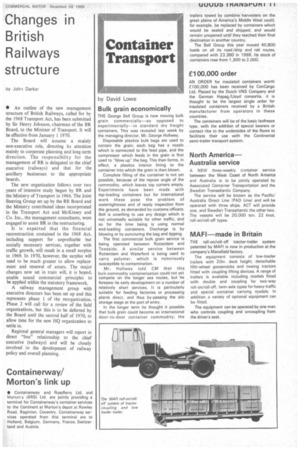by David Lowe
Page 13

If you've noticed an error in this article please click here to report it so we can fix it.
Bulk grain economically
THE George Bell Group is now moving bulk grain commercially—as opposed to experimentally—in standard dry freight containers. This was revealed last week by the managing director, Mr. George Hollwey.
Disposable plastics bulk bags are used to contain the grain; each bag has a nozzle which is connected to the feed pipe, and the compressor which feeds in the grain is first used to "blow up" the bag. This then forms, in effect, a plastics interior lining to the container into which the grain is then blown.
Complete filling of the container is not yet possible, because of the repose angle of the commodity, which leaves top corners empty. Experiments have been made with top-loading containers but for international work these pose the problem of watertightness and of ready inspection from the ground, as demanded by customs officers. Bell is unwilling to use any design which is not universally suitable for other traffic, and so for the time being is using normal end-loading containers. Discharge is by blowing or by puncturing the bag and tipping.
The first commercial bulk grain service is being operated between Rotterdam and Teesside. A similar service between Rotterdam and Waterford is being used to carry polymer, which is notoriously susceptible to contamination.
Mr. Hollwey told CM that this bulk-commodity containerization could not yet compete on the longer sea routes, but he foresaw its early development on a number of relatively short services. It is particularly suitable for feeding factories or processing plants direct, and thus by-passing the silo storage stage at the port of entry.
' In the longer term he thought it possible that bulk grain could become an international door-to-door container commodity; the trailers towed by combine harvesters on the great plains of America's Middle West could, for example, be replaced by containers which would be sealed and shipped, and would remain unopened until they reached their final destination in another country.
The Bell Group this year moved 40,800 loads on all its road /ship and rail routes. compared with 23.300 in 1968. Its stock of containers rose from 1,300 to 2,000.












































































